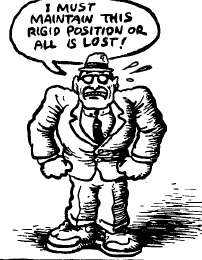The View From Frank Bruni's Bubble
Epistemic closure or epistemic chaos?

When people bring up the "filter bubble" idea—the notion that Americans in the internet era are retreating ever more deeply into parallel partisan universes—my usual reaction is Compared to what? People have been filtering out foreign perspectives for as long as the species has existed. The digital world may offer new tools for selecting what you want to see, but it also offers new ways for alien signals to penetrate our defenses; it's far from obvious that the first phenomenon is overpowering the second.
Frank Bruni's latest column at The New York Times recognizes that our filters predate the age of social media, yet he takes it for granted that they're getting more powerful now. A "tribalism that has existed for as long as humankind has," he writes, "is now rooted in the fertile soil of the Internet, which is coaxing it toward a full and insidious flower."
It's a popular story. It also flies in the face of several other popular stories. The big debate about Twitter right now, for example, involves the idea that it doesn't do enough to limit unwelcome outside signals. Even with blocklists and all the other ways tweeters have found to ignore each other, the internet's bubble-communities keep colliding.
Twitter is basically a bunch of 00s forums that would all hate each other mashed together but also for some reason, professional journalists
— Fail Earnhardt (@StuntBirdArmy) May 21, 2016
Meanwhile, on a canvass far larger than Twitter, the turmoil this year in the Republican Party may be a sign of many things, but it certainly doesn't look like a bubble impervious to outside signals. With the right-wing media split over Trumpism, and with Trumpism itself leading many people to speculate that a political realignment could be afoot, what we're watching looks less like closure than chaos.
Bruni, bizarrely, thinks Trump is evidence for the filter-bubble thesis:
We construct precisely contoured echo chambers of affirmation that turn conviction into zeal, passion into fury, disagreements with the other side into the demonization of it. Then we marvel at the Twitter mobs that swarm in defense of Sanders or the surreal success of Donald Trump's candidacy, whose historical tagline may well be "All I know is what's on the Internet."
It's neither new nor news that the passionate partisans of a presidential candidate are often prone to groupthink and to demonizing their opponents. That is true not just of Sanders' and Trump's much-mocked fans but of the followers of the candidate Bruni leaves out, Hillary Clinton. What Sanders and Trump reflect—and Clinton does not—is a campaign season when the political parties are finding it harder than usual to filter out the perspectives they'd rather exclude. The Sanders and Trump insurgencies are pricking their bubbles.
That, I think, is what Bruni is really upset about: not bubbles per se, but a slow leak depleting that vast bubble we call "the mainstream." "We've surrendered universal points of reference," he complains. "We've lost common ground….We're less committed to, and trustful of, large institutions than we were at times in the past." Large institutions like, say, the newspaper that employs Frank Bruni.
For further reading: I wrote a critique of the filter-bubble thesis back in 2011. You can read it here.


Show Comments (29)